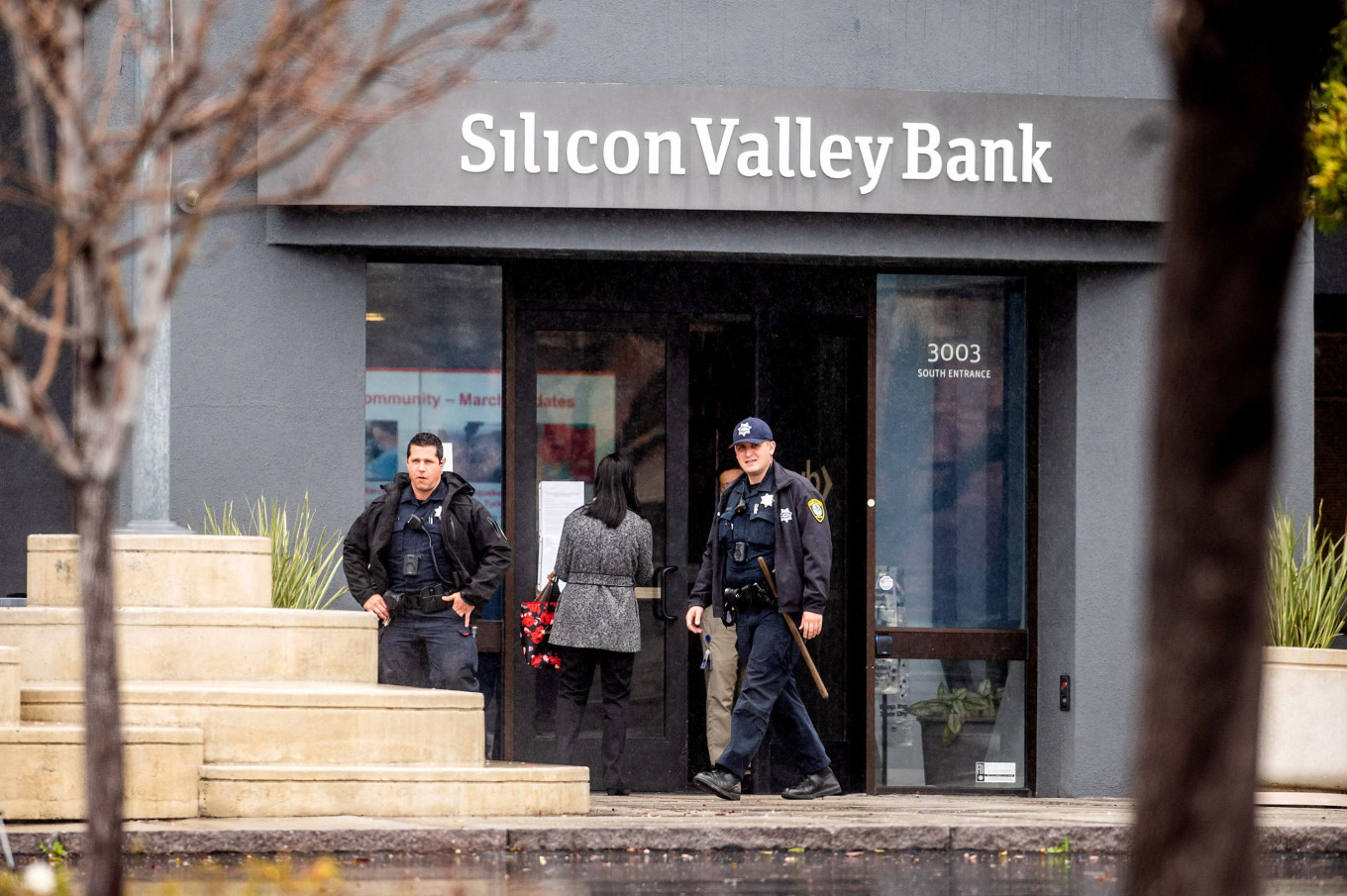Popular Reads
Top Results
Can't find what you're looking for?
View all search resultsPopular Reads
Top Results
Can't find what you're looking for?
View all search resultsSVB collapse poses little threat to RI, govt says
The collapse of Silicon Valley Bank (SVB) and Signature Bank has caused a certain degree of paranoia, reminding many of the horrors of the global financial crisis in 2008.
Change text size
Gift Premium Articles
to Anyone

T
he collapse of Silicon Valley Bank (SVB) and Signature Bank has caused a certain degree of paranoia in the industry, but it is unlikely to bring serious consequences to Indonesia except for sentiments among investors.
SVB’s rapid downfall on Friday was the second-largest bank failure in United States history, after the fall of Lehman Brothers, which triggered the global financial crisis in 2008.
The government and the Financial Services Authority (OJK) assured that much like the 2008 financial crisis, the recent US bank failure had little connection to Indonesia, thereby it posed little threat to the country as well.
“[SVB’s collapse] would have no significant impact on Indonesia considering SVB’s transactions with Indonesian financial institutions are miniscule,” Iskandar Simorangkir from the Office of Coordinating Economic Minister expert team told The Jakarta Post on Monday.
The repercussions of this would be much less than the 2008 crisis, given that SVB “is not a systemic bank to Indonesia”, he said, but urged the Financial System Stability Committee (KSSK) and financial regulators to stay alert over the short-term impact.
Fikri C. Permana, senior economist at KB Valbury Securities, expected that SVB’s collapse could trigger a certain amount of capital outflow, as investors move their money to safe-haven assets, such as such as gold and the US dollar, rather than financial assets in emerging economies, which are perceived to be higher risk.
Fikri said that the move could be triggered if investors became risk averse due to SVB’s collapse, but this was all due to a change in sentiment, which was mainly psychological.
“How big of [an outflow] it would be, I have no idea,” Fikri told the Post on Monday, adding “[but] it is very likely to happen”.
Read also: HSBC buys failed US bank SVB's UK arm for £1
Furthermore, supposing the SVB collapse affected Indonesia’s fundamentals – i.e. direct investment and GDP growth, he expected it would take quite long time to happen due to lack of direct connection between the lender and the country, he said.
Should the SVB trainwreck escalate to a Lehman Brothers level, he was sure the country could still weather the effect given its strong domestic economy.
M. Doddy Ariefianto, associate head of the finance program at Bina Nusantara (Binus) University, told the Post on Monday that the collapse was unlikely to have serious repercussions for Indonesian banks, pointing to the sound condition of the country’s banking industry.
Bank Indonesia data show that as of last December, the capital adequacy ratio (CAR) in the Indonesian banking industry stood at 25.63 percent and non-performing loans (NPLs) stood at a measly 2.44 percent, meaning the industry was in good shape.
“Other indicators like foreign and national government debts are also in a manageable condition. I think Indonesia’s financial sector is resilient enough to face [a 2008-level crisis],” said Doddy.
Moreover, US regulators have taken expeditious action to calm depositors and businesses, he said, making the chance of SVB’s downfall mushrooming into a Great Recession 2.0 even more unlikely.
The fall of SVB on Friday was particularly alarming given that nearly 90 percent of the deposits were uninsured, meaning that if the bank fails, a large chunk of the total US$175 billion in deposits could vanish into thin air.
The US Treasury Department devised a plan on Sunday to rescue depositors’ money in full using the Federal Deposit Insurance Corporation’s (FDIC) deposit insurance fund, allowing depositors of SVB and Signature Bank to access to all of their money the following day.
Read also: US regulators rush to contain SVB fallout, as a second bank fails
All these swift steps were taken as SVB and Signature Bank were designated to have a systemic risk. Therefore, US regulators needed to rush to prevent “contagion” risk to other lenders.
“Those [actions] calmed the market down,” said Doddy.
“Since, it has been handled well, I don’t think it will create a significant impact for Indonesia,” he added.
OJK banking supervision head Dian Ediana Rae urged customers and industry players to stay calm. He assured on Monday that SVB’s collapse would not directly impact the local banking industry, given most banks had little-to-no business relations, facility lines or investments in SVB's security products.
He also said that no Indonesian banks were currently classified as a “bank under resolution”, a term authorities used to indicate a lender in financial distress.
Economics professor at state-run Jakarta State University (UNJ) Haryo Kuncoro, urged the government and regulators to remain vigilant, emphasizing the importance of anticipating the risks nevertheless.
He said Indonesia had gone through and learnt a lot from the Lehman Brothers event, which lessons could be useful to navigate the current conditions.
“The 2008 experience is a valid reference for us,” Haryo told the Post on Monday.
Finance Minister Sri Mulyani Indrawati, who also chairs KSSK, said on Tuesday, the government and regulators will remain vigilant and continue to monitor the development closely to ensure there is no significant effect to Indonesia economy and financial system.









